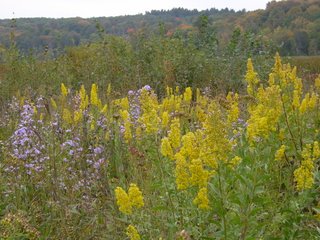Jesus' Call and the Cycles of Life

This is a photo shot while on a walk yesterday through a mixture of forest, grasslands, and marsh. We are getting close to my favorite time of year (late September/early October), when the whole earth changes colors--seemingly to shout out its glory to its Maker. There are just hints of reds and yellows in the trees here--we're only about 15-25% of the way towards "peak." In a matter of a few weeks, these purples and golds displayed by the wildflowers will have been superseded by the display put on by the maples, birches, aspens, and oaks.
During such a time, as nature begins to prepare itself for the long, cold winter ahead, there is a tendency for us to begin to look inward as well. In today's gospel lesson from St. Mark, Peter boldly proclaims that Jesus is Messiah, only to be called to a different understanding of the term than the one he brings. The Master's call to faithful living and dying to self seems extraordinarily countercultural to most of us (not to mention completely at odds with the great "Santa Claus in the sky" image perpetuated by much of American Evangelicals).
In the homily for today, Fr. Dale Launderville spoke of Jesus' call as one in which, "the rewards are delayed to the point of not materializing." He reminded us that it is grace alone that allows us to keep our commitment to faithfulness, whether that is a monastic or a marriage vow. He then asked an important question: What makes the cross bearable or even a sense of joy? What sets our calling apart from that of today's terrorist who acts as a suicide bomber? The distinction he made was an important one: the suicide bomber uses violence that is aimed at his/her enemies--giving up himself in order to wreak vengeance on another. Jesus, instead (taking on himself the Old Testament text from Isaiah today), allows the violence to be directed at himself for the purpose of bringing peace and reconciliation to the entire world, including his enemies.
The result, Fr. Dale suggested, is that we can now learn to live in a world of injustice without resorting to "an eye for an eye, a tooth for a tooth." Learning to accept insults and injuries is an important part of our growing up and becoming an integral part of a reasonable, civilized life. And then he even went so far as to say that the anonymous fear of terrorists which has taken such a grip on American culture is actually less threatening than the very real devouring of one another that has us so gripped in materialistic excess. Our obsession with the accumulation of goods prevents us from living out Christ's call to discipleship.
I couldn't help but think back to that walk yesterday and the realization that there is a certain cycle to nature of life and death. In our culture, we do all we can to hide from and postpone death. Yet, if Jesus' calling is to the "way of the cross," aren't we being called to die (and as the evangelist Luke puts it, to do so "daily")? While this doesn't mean adopting a masochistic approach to the journey of faith, it does suggest recognizing the artificial barriers we construct for ourselves in an attempt to hold death at bay.
One of my goals for these few months here is to learn to accept what it means to be a year short of my fiftieth birthday and to recognize how my own role and calling have changed. It seems strange to think that I can't do what I once did, that there are no longer countless decades (the majority of my life) left to think about working full time. There is so much yet to be accomplished and there seems so little time in which to accomplish it. How does one find balance to the multiplicity of roles one must assume? I hope that I can simply find the grace, like those wildflowers, to accept my calling, to blaze forth color when called upon to do so, and then to find peace in the waning years of my life to fade into the background and allow the work I have done to be built upon by others.


<< Home